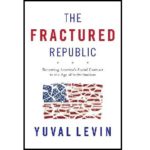You can’t win it all in the genetic lottery—or, at least, I didn’t. I won some, such as being six feet tall with a full head of hair, and I lost some, such as having cataracts develop in my early thirties. Thanks, Mom.
In any other time or place, this would have meant declining vision and even early blindness, but we live in an age of medical marvels. Not only can cataracts be removed, but my clouded natural lenses can also be replaced with customized synthetic lenses, thereby improving my eyesight. I have already had one eye operated on, and I am looking forward to the next operation. I was going blind, but now I see.
From a historical perspective, this technological triumph seems miraculous. Yet it is only one small example of the blessings of the modern world. The American middle class, and even many of the poor, have more material comforts than kings and merchant princes of old. We have abundant and varied food, indoor plumbing and hot water with the twist of a knob, light with the flick of a switch, warm or cool air on demand, rapid and comfortable transportation, and books, music, and other entertainment in endless digital profusion. But the astounding has become normal. Our expectations have adjusted, and we are more inclined to be angry when our everyday miracles fail than to be grateful for their usual efficacy. Wonder at the convenience of a car is dwarfed by anger at traffic, or frustration at mechanical troubles.
The amazing becoming ordinary is part of why, in this time of unprecedented prosperity and technological prowess, many people are unhappy and angry enough to want to burn society down. But ignorance of, and ingratitude for, how materially good we have it cannot bear all the blame. The economic system and technological progress that have driven our prosperity have also produced many profiteers of unhappiness and machines of misery.
Start your day with Public Discourse
Sign up and get our daily essays sent straight to your inbox.Our economic culture makes every effort to promote dissatisfaction, for there is money to be made when people are unhappy or bored with what they have.
Our economic culture makes every effort to promote dissatisfaction, for there is money to be made when people are unhappy or bored with what they have. Advertising aims to inflame desire, which already tends to expand beyond our means. But advertising not only sells stuff and services; it also markets status and significance. Commercials use images to incite our vanity and envy, hoping that this will induce us to try to buy the identities we aspire to. The advertising often works; the purchase of identity does not. A good S`cotch, or a good suit, or whatever else takes one’s fancy, is a nice thing, but consumption is a hollow source of identity.
The finer things in life are pleasant to have, but they are still things, and they cannot satisfy our relational needs. It is in relationships that we can find happiness. Yet many of the factors that have made us rich are degrading our ability to develop and sustain fulfilling relationships.
There are pockets of real material deprivation in America, but the dramatic increase in deaths of despair from suicide, drugs, and alcohol is not a tale of poverty alone. It is about the loss of respect, community, family stability, and hope. These losses result both from the structure of our economy and from the technological developments that it encourages and depends upon.
The globalized, high-tech economy generates enough excess wealth to provide for the basic material needs of those Americans whom it leaves behind. But the dynamism that creates this abundance is unstable: it erodes job security, encourages mobility, and sometimes economically devastates entire regions. The economic stability that encourages family formation and provides a foundation for community is thus sacrificed in exchange for a higher GDP. Shamefully, some conservatives who are eloquent about the importance of predictable tax and regulatory regimes for businesses are silent when it comes to the necessity of stability for families and communities.
It is not that living a life integrated within family and community is easy—often it is not. Rather, regardless of its difficulty, such a life is essential to human flourishing. Unfortunately, our political and social discussions tend to focus on prosperity and technological proficiency while overlooking relational well-being.
Those with political and cultural power tend to ignore the needs of families and communities outside their own class. Thus, the federal government’s moving a few hundred jobs from DC to Kansas City has been extensively covered—see for instance, this long, sympathetic piece in the Washington Post. The travails of some families and communities merit more attention than others. A transgender federal employee taking early retirement rather than moving to Kansas City is a story of economic displacement that elite media want to tell. Reporters and editors are less concerned with the fates of those in logging towns in Oregon, mining towns in West Virginia, or factory towns all over the country.
We should not romanticize such places, but neither should we cheer their destruction for the cause of greater economic efficiency, offering them only the gospel of U-Haul (from the Right) and government handouts (from the Left). Efficient markets are not the only, or even the primary, human good, and the pursuit of maximal economic efficiency is harmful to full human flourishing. With our national wealth, we can afford to consider what a humane, family-friendly economy might require, rather than to accept familial and community breakdown as the price of riches.
Similarly, technological development ought to serve the common good. Our modern technology can accomplish deeds that were once in the province of the miraculous, such as preserving and restoring sight. But what is there to see?—family and friends, or Netflix and internet porn? The internet is a technological marvel, but it often encourages and enables base impulses, and thereby destroys human relationships and human goods.
Our modern technology can accomplish deeds that were once the province of the miraculous, such as preserving and restoring sight. But what is there to see: family and friends, or Netflix and internet porn?
Some problems are obviously dystopian, such as our increasing capability to create realistic fake porn, and the extent to which the internet is driven by bot traffic. People are getting plastic surgery to look more like their own filtered selfies. Tech giants have enormous power to suppress opinions they dislike, and they monitor our every online move in order to influence us. But technological dangers extend well beyond overt cases of abuse. As the digital world becomes integrated into the rest of our lives, Big Tech gains the power to direct how we see the world and ourselves, often without our notice. My cohort was among the last to make it through our teenage years before social media were ubiquitous, and I find the thought of junior high with social media horrifying. Our digital overlords know the dangers that the world they create for us holds, and they seek to preserve their own families from what they sell to the rest of us.
Our phones and other digital devices are becoming misery machines. It is possible to use our devices, apps, and social media responsibly, and many people do. But because of the financial incentives to themselves, companies encourage us to use technology irresponsibly. Facebook earns less from infrequent users who only log in for short times. It is much more profitable to be an ever-present digital community, assistant, news feed, photo album, and more. Big Tech is incentivized to encourage addiction, and to overlay the digital world onto reality. Thus, when relationships are not displaced by digital entertainment they are often subsumed by the simulacra of social media.
Social media offer connection, but also pervert it, encouraging both oversharing and the increased curation of one’s public image. Slight acquaintances, and even strangers, are given access to personal details; but everyone, including close friends and family, is presented with a cultivated digital façade. Interactions on social media mimic the relational connections that we crave, and digital society can provide us with easy affirmation and validation. Social media are the junk food of human interactions. Yet these narcissistic payoffs are offered in an exceptionally insecure form. The exponential expansion of connections exposes users to the caprice, comparisons, and indifference of the whole world. Online approval is ephemeral, but online hate endures. Likes fade and shares are forgotten, but screenshots endure forever.
Online approval is ephemeral, but online hate endures. Likes fade and shares are forgotten, but screenshots endure forever.
Thankfully, not everyone is subjected to the worst of online vendettas and mobs. However, social media are harmful even without those excesses. Not only is the business of social media to deliver eyeballs to advertisers—who often stoke our avarice, envy, and insecurity—but the environment of social media turbocharges the envy, insecurity, and status-seeking that always threaten healthy relationships and communities. All too many of us know people whose social media habits or internet addictions have catalyzed the destruction of relationships and families.
And it never ends. The internet never sleeps. There is always more content to consume, or to create, or to rage about. There are always more interactions and clicks to pursue, and more likes and retweets to give and receive. Vanity of vanities, all is vanity, a chasing after the wind.
From children to the president, we would be better off if we logged off and spent more time with others in physical community, fellowship, and service. As a culture and polity, we should reflect on how our technological tools may be impeding human flourishing, and how we ought to respond. As citizens of the modern West, we have won the historical lottery in many ways, with unprecedented wealth, freedom, and technology. Yet we still struggle to be happy.
There is no national program for happiness to implement. But an emphasis on preserving and protecting family and community, even if it somewhat impedes economic efficiency, would be salutary. We ought also to be skeptical of the autonomous development and deployment of technology, especially what substitutes for authentic human relationships. We are rich and can give sight to the blind, but without love, it is nothing.














